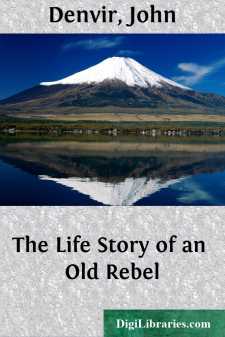Categories
- Antiques & Collectibles 13
- Architecture 36
- Art 48
- Bibles 22
- Biography & Autobiography 813
- Body, Mind & Spirit 142
- Business & Economics 28
- Children's Books 17
- Children's Fiction 14
- Computers 4
- Cooking 94
- Crafts & Hobbies 4
- Drama 346
- Education 46
- Family & Relationships 57
- Fiction 11829
- Games 19
- Gardening 17
- Health & Fitness 34
- History 1377
- House & Home 1
- Humor 147
- Juvenile Fiction 1873
- Juvenile Nonfiction 202
- Language Arts & Disciplines 88
- Law 16
- Literary Collections 686
- Literary Criticism 179
- Mathematics 13
- Medical 41
- Music 40
- Nature 179
- Non-Classifiable 1768
- Performing Arts 7
- Periodicals 1453
- Philosophy 64
- Photography 2
- Poetry 896
- Political Science 203
- Psychology 42
- Reference 154
- Religion 513
- Science 126
- Self-Help 84
- Social Science 81
- Sports & Recreation 34
- Study Aids 3
- Technology & Engineering 59
- Transportation 23
- Travel 463
- True Crime 29
The Life Story of an Old Rebel
by: John Denvir
Description:
Excerpt
CHAPTER I.
EARLY RECOLLECTIONS—"COMING OVER" FROM IRELAND.
I owe both the title of this book and the existence of the book itself to the suggestion of friends. I suppose a man of 76 may be called "old," although I have by no means given up the idea that I can still be of use to my country.
And a Rebel? Yes! Anything of the nature of injustice or oppression has always stirred me to resentment, and—is it to be wondered at?—most of all when the victims of that injustice and oppression have been my own people. And why not? If there were no rebels against wrong-doing, wrong-doing would prosper. To an Irishman, who is a fighter by temperament, and a fighter by choice against those in high places, life is sure to provide plenty of excitement; and that, no doubt, is why my friends have thought my recollections worth printing. The curious thing is that my share in the struggle for Irish self-government has been almost entirely what I might call outpost work, for I have lived all my life in England.
Indeed, it seemed but a stroke of good luck that I was born in Ireland at all. My father (John, son of James Denvir, of Ballywalter, Lecale) came to England in the early part of the last century, and settled in Liverpool, where my eldest brother was born. It was during a brief period, when our family returned to Ireland, that I and a younger brother were born there. My father was engaged for about three years as clerk of the works for the erection of a castle for Sir Francis Macnaghten, near Bushmills, County Antrim. This must be one of the least Catholic parts of Ireland, for there was no resident priest, and I had to be taken a long distance to be christened. There was a decent Catholic workman at the castle, James MacGowan, who was my god-father, and my Aunt Kitty had to come all the way from "our own place" in the County Down to be my god-mother.
Brought to England, my earliest remembrances are of Liverpool, which has a more compact and politically important Irish population than any other town in Great Britain.
Anyone who has mixed much among our fellow-countrymen in England, Scotland and Wales knows that, generally, the children and grandchildren of Irish-born parents consider themselves just as much Irish as those born on "the old sod" itself. No part of our race has shown more determination and enthusiasm in the cause of Irish nationality. As a rule the Irish of Great Britain have been well organised, and, during the last sixty years and more, have been brought into constant contact with a host of distinguished Irishmen—including the leaders of the constitutional political organisations—from Daniel O'Connell to John Redmond.
I have taken an active part in the various Irish movements of my time, and it so happens that, while I know so little personally of Ireland itself, there are few, if any, living Irishmen who have had such experience, from actual personal contact with them, as I have had of our people in every part of Great Britain. As will be seen, too, in the course of these recollections, circumstances have brought me into intimate connection with most of the Irish political leaders.
My father came to England in one of the sloops in which our people used to "come over" in the old days. They sometimes took a week in crossing. The steamers which superseded them, though an immense improvement as regards speed, had often less accommodation for the deck passengers than for the cattle they brought over.
Most of the Irish immigration to Liverpool came through the Clarence Dock, where the steamers used to land our people from all parts. Since the Railway Company diverted a good deal of the Irish traffic through the Holyhead route, there are not so many of these steamers coming to Liverpool as formerly.
The first object that used to meet the eyes of those who had just "come over," as they looked across the Clarence Dock wall, was an effigy of St. Patrick, with a shamrock in his hand, as if welcoming them from "the old sod." This was placed high upon the wall of a public house kept by a retired Irish pugilist, Jack Langan....


